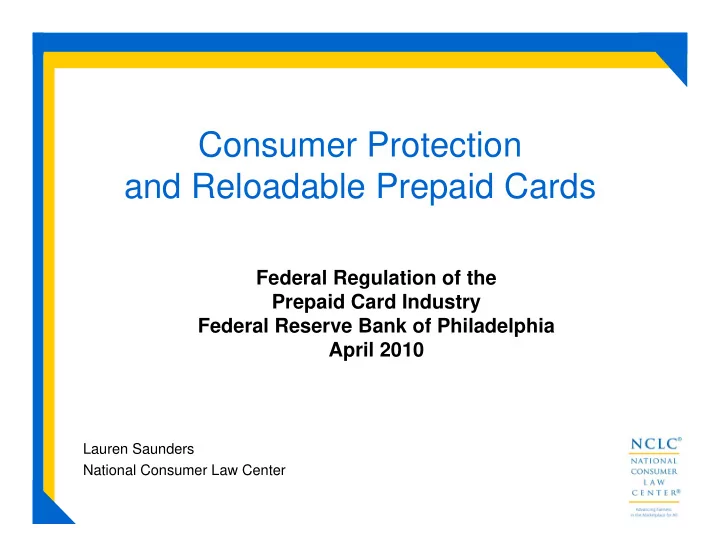

Consumer Protection and Reloadable Prepaid Cards Federal Regulation of the Prepaid Card Industry Federal Reserve Bank of Philadelphia April 2010 Lauren Saunders National Consumer Law Center
Types of Reloadable Prepaid Cards • Privately selected by consumer. • Mandated: – Payroll cards – Non-EBT (non-needs based) public benefits and other government payments (Social Security, unemployment, child support) – Electronic Benefits Transfer (EBT) (TANF, other needs- based programs)
Opportunities and Perils • Prepaid cards benefit from banking industry neglect, failures in reaching unbanked. • Can offer real advantages to consumers. • Must emerge from the “shadow banking system”: carry full consumer protection, avoid missteps of banking products.
7 Essentials for Consumer-Safe Prepaid Cards 1. Choice. 2. FDIC insurance. 3. Conspicuous, usable disclosures. 4. No unreasonable fees. 5. True protection from unauthorized use, loss, errors. 6. Transaction information, statements available. 7. No dangerous credit features.
1. Choice • Privately selected cards: Consumer chooses. • Mandated cards: Consumer must have choice of direct deposit first, and option of a paper check in case of hardship (disability, location).
2. FDIC Insurance No reloadable prepaid cards should be permitted on the market if not structured to ensure FDIC insurance to the consumer on a direct or pass- through basis (i.e., in compliance with FDIC General Counsel Opinion No. 8 (Nov. 13, 2008).
3. Disclosures • Fees, ID requirements, prominently visible before purchase or enrollment; “Schumer box” • Provide wallet-size card listing fees. • Card and exterior package show phone number, website for full info on fees, terms & conditions. • Fees easily findable on website (not buried in fine print terms and conditions). • Consumer-friendly T&C, i.e. re dispute rights.
4. Fees to Prohibit for All Cards: • Overdrafts or “shortages” • Denied transactions • Balance inquiries • Customer service • Inactivity, expiration • Periodic statements (above $1/month) • Ad hoc request for statements • Closing account, final check • Fee for one replacement card/year
4. Fees (cont.) Prohibit for Mandatory Cards: • Application • Participation (monthly, annual, etc.) • One ATM and one teller withdrawal per deposit, and at least 2/month • Purchases, regular transactions • Loading benefits, wages • Any fee for ordinary use of the card.
5. True Protection from Unauthorized Use, Loss, Errors • EFTA, Regulation E coverage. • Improve Reg E payroll card rule: Trigger timelines to dispute a charge, fee only upon receipt of information reflecting the unauthorized use, error. • Not by mere “availability” of information on a website based on the myth that the unbanked are monitoring accounts online.
6. Statements and Transaction Information Why important? -- make it easy (not theoretical) to monitor for identify theft, errors -- personal budgeting, recordkeeping -- make fees visible, give consumers the ability to know about and avoid them so not a hidden tax
6. Statements and Transaction Information • Periodic statements must be available, for $1/month or less. • Rules should encourage text, email and telephone alerts. • Make ad hoc statements available for free. • At least one free annual summary statement if other options not chosen.
7. No Dangerous Credit Features • iAdvance, others: 150%-650% APR payday loans on prepaid cards. • Need to prohibit automatic repayment/offset features, which avoid laws protecting essential income and security of one’ account. • Low-income consumers need ability to pay food, rent before lines of credit. • Credit card repayment cannot be linked to bank accounts; assets in prepaid accounts should have the same protection.
Is All This Too Much To Ask? No! Comerica’s Direct Express Card for Social Security and SSI benefits has most of these features.
Thank you. Lauren Saunders National Consumer Law Center (202) 452-6252 x 105 LSaunders@nclcdc.org
Recommend
More recommend